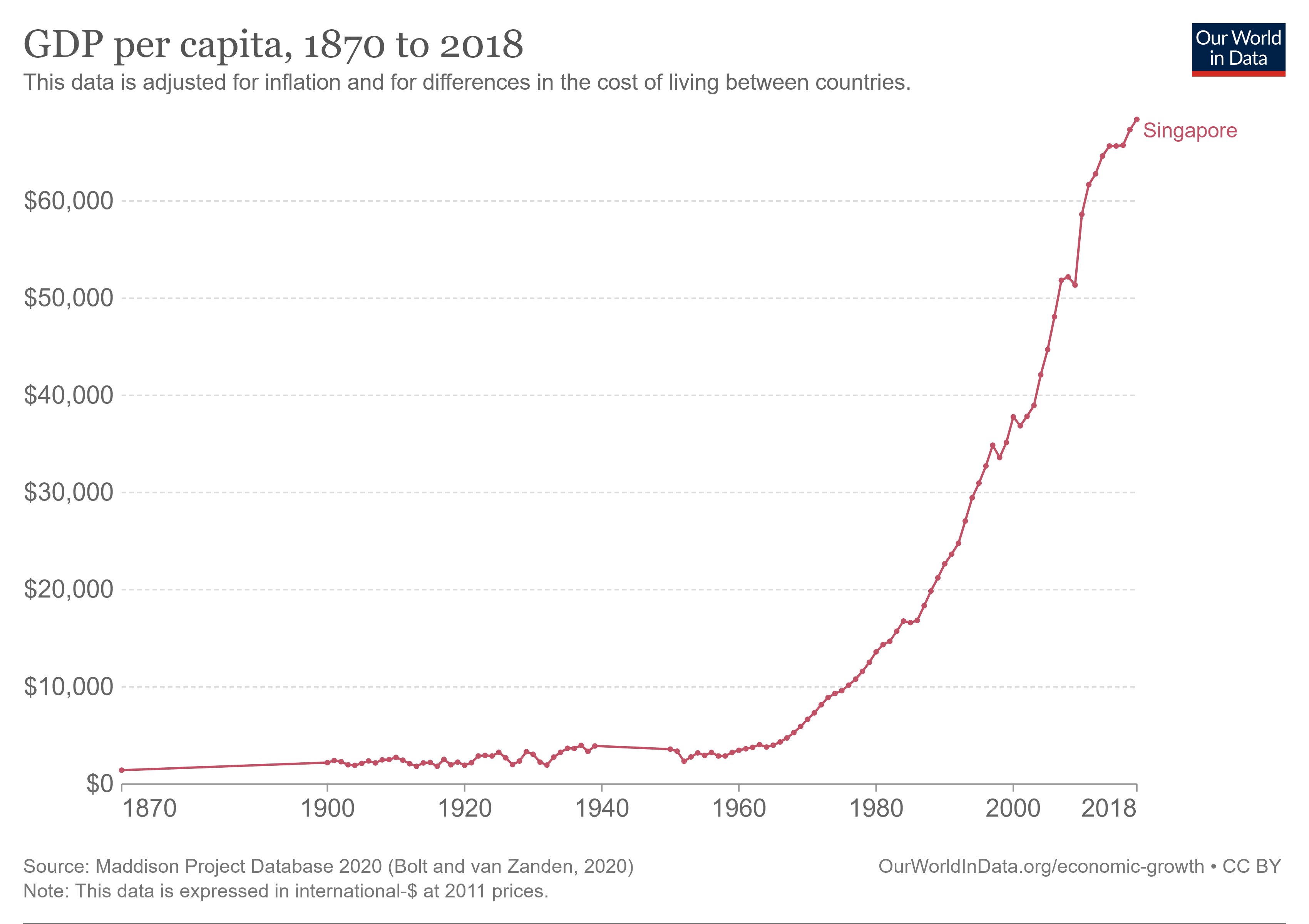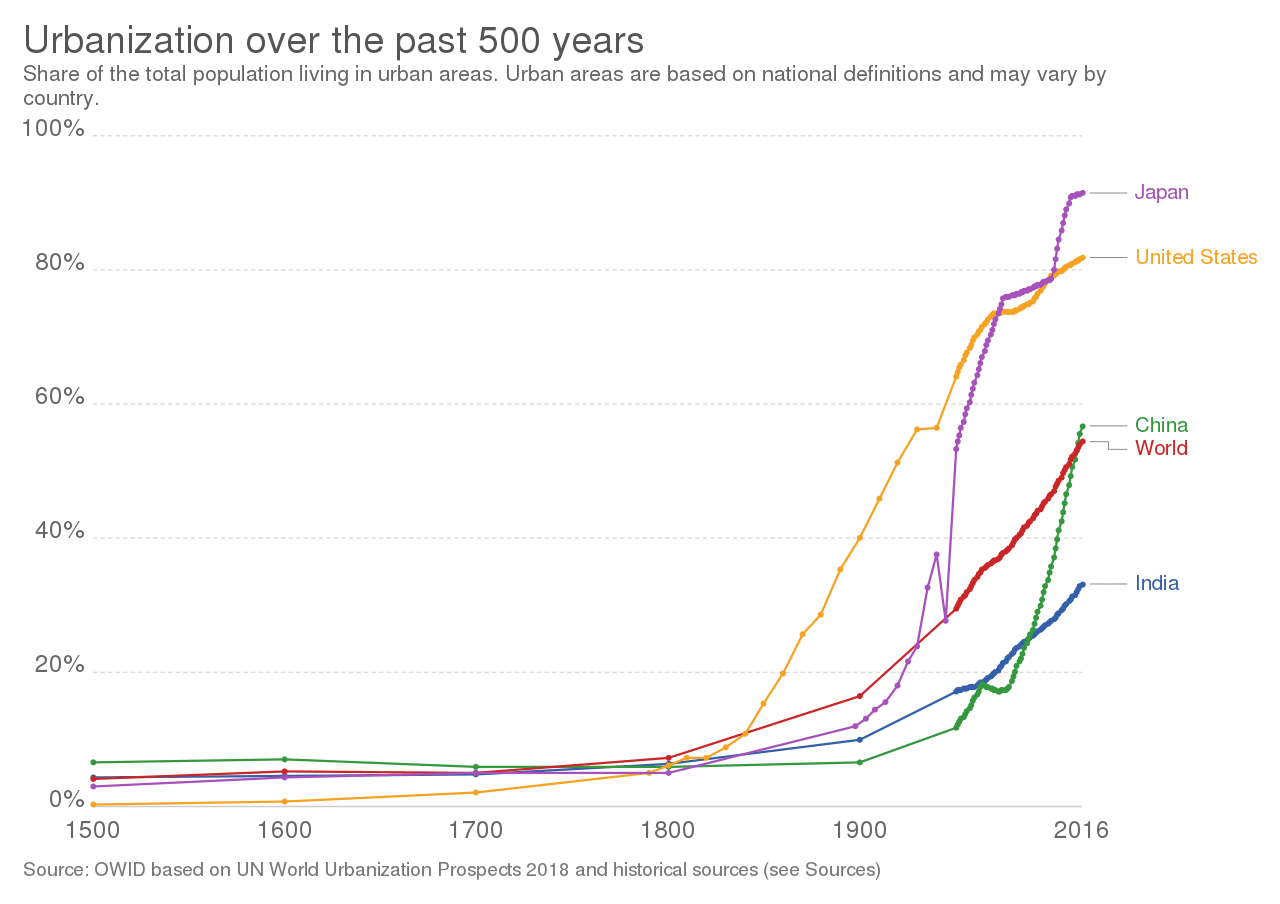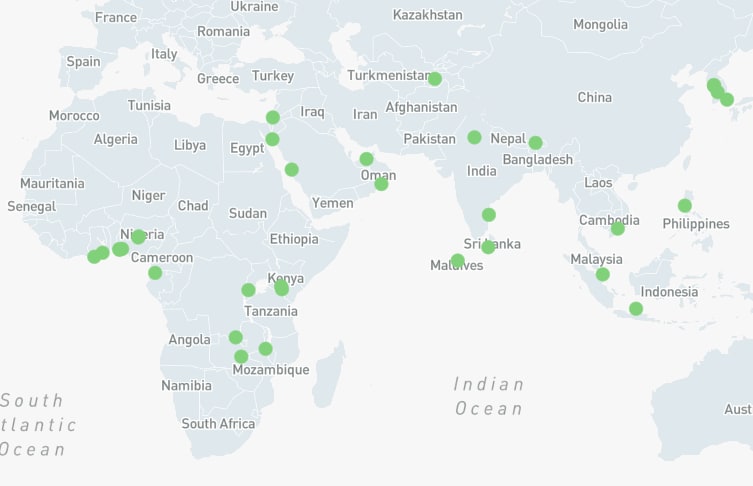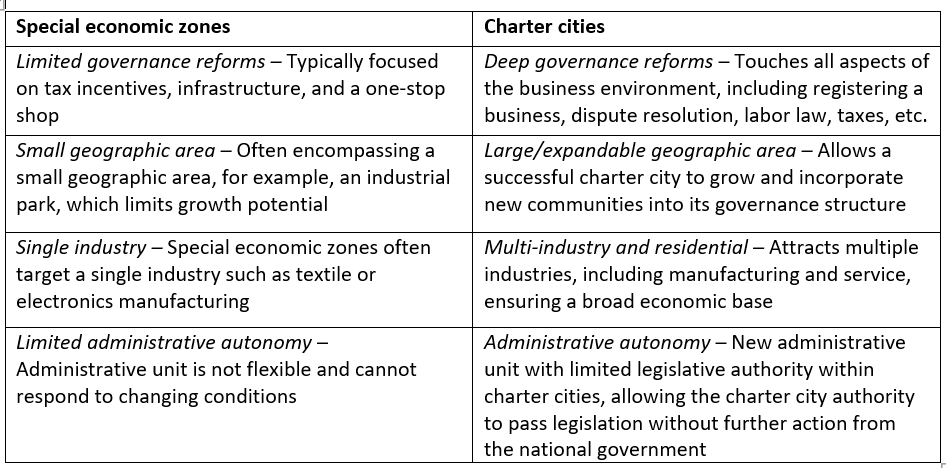Charter Cities: why they're exciting & how they might work
By Jackson Wagner @ 2023-07-18T13:57 (+24)
Hello! What follows is a work-in-progress script about the idea of Charter Cities, which the EA-adjacent youtube channel RationalAnimations plans to animate soon. I want to make sure I'm presenting the idea of charter cities properly and in a compelling, understandable way, so I thought it would be helpful to post it here and get feedback from this forum!
Introduction: charter cities, as economic growth, as neartermism
When you think about ways to help people in developing countries, you probably think of international aid -- providing medical supplies, or coordinating disaster relief, or even just giving cash, like we discussed in our recent video about global poverty. These things are great, and this kind of charitable aid saves lives every day. But there’s something a little curious here, because these interventions AREN’T what helped the world’s most prosperous countries succeed in the first place.
Up until the 1700s, essentially the entire population of the planet lived in poverty. [1] That started to change during the industrial revolution, when humanity developed more efficient, mechanized ways of producing goods and capturing energy. Hundreds of millions of people were able to live better lives thanks to economic growth -- learning to use technology to grow food, make clothes, and get from place to place more efficiently.
The overwhelming importance of economic growth remains true in modern times -- by far the greatest ongoing reductions in poverty and suffering are coming not from international aid projects, but from development, as low-income countries find new ways to do things more efficiently and climb the ladder of technological advancement.

For example, in the year 1960, Singapore was a poor and undeveloped country, producing only $428 per citizen. Today, singapore’s economy has grown by many times, to around $73,000 per person.[2] That’s an incredible amount of progress within a single lifetime.
Almost every country on earth has made some economic progress over the past few decades, but unfortunately only a few have succeeded as spectacularly as economic-development superstars like Singapore, or South Korea. There are hundreds of millions of people still living on just a few dollars per day, like Singaporians in 1960. So, why do some countries grow more quickly than others? And, since economic growth continues to be the most powerful force for reducing poverty and suffering, how can we help countries with slower growth learn from the biggest successes?

One important factor is the quality of a country’s institutions[3]: Can the local court system make fair and speedy decisions, or do cases take years to resolve while working through a system mired in corruption? Can the local government efficiently build infrastructure for electricity, roads, and public transit? Are elections trustworthy? Can people be confident that their savings and investments are secure?
Trying to improve a nation’s existing institutions can thus be very helpful, but it can also be very difficult. When a system has been around for a long time, there will always be a lot of entrenched interests who benefit from the status quo and like things the way they are. But if you want to reform a broken institution, there’s no avoiding this kind of long, arduous political struggle, right?

Describing the charter city concept & the example of Itana, Nigeria
Well, in 2009, Nobel-prize-winning economist Paul Romer proposed a new strategy. He argued that going through the painstaking process of fighting for incremental changes from within the existing system might not always be a country’s best choice. Sometimes, it might be easier to start from scratch, developing an entirely new city with a new legal code and new institutions, inspired by the best international examples.[4]
Charter cities, Romer said, would be like a nation within a nation. They’ll still need to follow their mother country’s constitution, criminal code, and international treaties, but should otherwise be given the freedom to design their own legal code to encourage the growth of new industries -- setting their own immigration rules, tax codes, business regulations, civil court systems, and more. The way that the city holds elections, the structure of its government, and the way it provides public services could all be designed based on the playbook of success stories like Singapore.
There aren’t many charter cities that exist today, but for a real-world example, let’s look at “Itana”, a small charter city project being spearheaded by the Nigerian entrepreneur Iyinolowa Aboyeji[5]. Itana is a town being built near Lagos, designed to attract talented tech workers from across Africa to found their own new companies or work remotely for employers overseas. Of course, in order to realize that dream, Itana is going to need a stable supply of electricity and a strong internet connection. But that’s difficult in Nigeria, which has struggled for decades with electrical blackouts and grid collapses, only managing to provide power for about four hours out of each day.[6] One of the many obstacles to better service is that the government insists power be provided very cheaply. It’s a vote-winning policy, but it makes power companies reluctant to transmit electricity that they’re forced to buy at a high price and sell at a loss.[7] This is one reason Itana wants the ability to write its own business regulations -- if Itana could choose to pay a higher price for more consistent power, that could set the stage for a brighter future.
Furthermore, in order to attract talented people from across all of Africa, it would be great if Itana could write its own, town-specific immigration rules, granting visas quickly instead of having them go through an arduous, months-long process. And for similar reasons, it’s planning to make it as easy as possible for entrepreneurs to quickly register a new business.

Objection: why whole new cities?
Now, some of you might be thinking -- this sounds nice, but isn’t it overkill to build an ENTIRE NEW CITY, just to test out some better business regulations? Who would want to be the first to move there? It’s true that this might seem drastic in places like the United states, where no new large cities have been built in the last hundred years. But across Latin America, Africa, and Asia, millions of people move from the countryside to urban areas each year, with the United Nations expecting 2.5 billion new city-dwellers by 2050.[8] Urbanization in many countries is happening so fast that it’s outpacing the ability of existing cities to build supporting infrastructure -- leading to problems with providing clean water, electricity, and so on.[9] Lagos, for instance, is one of the fastest-growing cities in the world, doubling in size over the past twenty years from seven million to fourteen million people.[10] Building out infrastructure for new charter cities would help channel the power of this urbanization to create healthy, productive engines of long-term growth, rather than stressing existing megacities with continuing haphazard, unplanned sprawl.

Objection: Political Tractability
A bigger problem is political feasibility. The whole point of giving a city the ability to write its own rules is to make reform easier, but in order to get that ball rolling, you first need to find a nation willing to give away lots of their own regulation-writing authority in order to enable your charter city project. This isn’t completely unheard of -- in many ways, charter cities are just a bigger and bolder version of “Special Economic Zones”, where a port might be granted lower tariffs or streamlined permitting for the sake of spurring industrial development. Nevertheless, asking for broad autonomy to create an entire city is a tall order.
Indeed, Paul Romer was originally involved in efforts to create charter cities in Madagascar and Honduras, but later abandoned both projects. Despite being invited by each country’s president, the idea became politically controversial in both nations, and the project in Madagascar fell apart when the president’s party was voted out of power.[11] In Honduras, a law authorizing charter cities was passed after years of political wrangling, but Paul Romer distanced himself from the result, saying that Honduran corporate special interests had corrupted his original vision.[12]
Wider benefits: inspiration, competition, & experimentation
Charter cities are a new idea -- the first projects are just getting started now -- so we don’t know for sure how politically tractable they’ll be to create, or how effectively they’ll boost growth. But these uncertainties should be weighed against the immense potential benefit -- the chance to lift millions of residents out of poverty through improved governance and sustainable economic growth.
And, it gets even better, because it’s likely that the growth-boosting benefits of charter cities could spread to far more people than just the residents who move there. There are three main ways this could happen: inspiration, competition, and experimentation.
First, seeing legal reforms work well on a small scale could inspire larger national changes. For instance, Itana in Nigeria is only planned to be a small town of a few thousand people at first. But if Itana’s ideas prove successful, they might inspire national-level policy changes that could improve the lives of all of Nigeria’s 200 million inhabitants.
Second, is the idea that charter cities could spur “governance competition”. If you give people lots of options about where and how to live, people will naturally flock to the places that offer them the most freedom, safety, and prosperity. Unfortunately, right now, lots of people don’t have many good options, and that makes it easier for governments to restrict people’s rights or otherwise exploit their citizens. In a world with lots of charter cities, fewer people will have to put up with that kind of abuse, and would-be exploitative governments will be pressured to start treating their citizens better, lest they start losing all their best people to the city next door.
Finally, experimenting with totally new types of law could bring huge benefits. What about going beyond just imitating the best practices of developed countries, and instead trying to do even better? Since charter cities are building whole new laws and institutions from a clean slate, it’ll also be easier for them to experiment with radically new concepts which, if successful, could become leading examples for the whole world.
For example, Prospera is a charter city that’s currently operating within a special economic zone in Honduras.[13] They've implemented a completely novel legal framework that enables rapid innovation across industries. Alongside benefits for areas like finance and biotech, Próspera's legal platform enables architects to design modern, eco-friendly buildings connected by parks and walking paths, in a way that wouldn’t be possible under the zoning rules of most American cities.[14]
There are all kinds of new policy ideas that charter cities could potentially explore. The new-city project of Telosa is planning to base its economic system around the philosophy of “Georgism”, taxing land in a way that will help fund city services while also avoiding the problems of high rental prices that plague many big cities. A city could also try out improved ways of voting, like “liquid democracy”, or they could take inspiration from a previous video of ours, and have the city government use prediction markets to help inform important public decisions. All of these ideas would be considered huge, fundamental reforms to the status quo of today’s rich countries. Trying them out on a small scale in a charter city would be much easier.

Conclusion
The idea of building charter cities with new legal systems to boost economic growth is strange and untested. Today’s projects are small, with uncertain prospects. But consider this: two hundred and fifty years ago, the United States was small and uncertain. It was experimenting with a bizarre, Roman-era style of government called “democracy”, and nobody knew if it would really work. But over time, democracy proved so successful that it inspired countless nations around the world to make the switch -- and this new system led to greater peace, faster economic growth, and more human freedom.
If some of today’s charter cities are successful, then maybe the idea of semi-autonomous cities could spread across the world just like democracy did. A century from now, maybe the idea that promoting governance competition leads to faster growth and greater liberty, will seem just as obvious as the idea that an elected president usually provides better leadership than a dictator or a king. Charter cities today are focused on making life better for the people who choose to move there. But if we’re lucky, they might help make our civilization wiser, richer, fairer, and better able to navigate future challenges.

Resources to learn more
If you loved this video, consider checking out the website of the Charter Cities Institute to learn more. The Charter Cities Institute does research to understand the detailed legal frameworks and governmental best-practices that new cities can use to set themselves up for success. They also consult with interested governments and city developers, spreading the word about the charter cities idea and helping new projects get off the ground.
On their website, you can read their research and learn the history of development superstars like Dubai and Shenzhen. You can also listen to podcast interviews with the people involved in some of today’s most exciting new city projects.
Another fun resource is the “Startup Cities Map”, where you can learn about dozens of innovative special economic zones and ambitious new-city projects underway across the developing world.
And as always, we have detailed links in this video’s description, so if you want to read all about Prospera Honduras’s 3D voxel-based property rights, or watch the original TED talk where Paul Romer first introduced the idea of charter cities, you can check out those links!
MvK @ 2023-07-18T16:43 (+19)
I think this does a great job of introducing the concept of a charter city to audiences with little prior exposure to these ideas.
That said: I know this is for a YouTube video and I might just be too immersed in academic/research culture and hedging, but this feels a little too much like an advertisement to me.
As a report by RethinkPriorities points out, there's a number of reasons to think Charter Cities are not the most effective way to alleviate poverty:
- Lack of tractability, mostly caused by difficulties of coordination between many stakeholders
- Indirect effects might be huge, but are hard to measure: "We could not find a comprehensive argument for the value of these indirect benefits being large."[1]
- Nearest empirical analogue (SEZs) seem to only marginally outperform host countries
- Large development cost
You choose one example of a Charter city that could be deemed to be a success, but omit mentioning those that are widely considered "failures". According to the aforementioned RP report, Paul Romer - who you mention - turned away from the idea because of these failures in Honduras and Madagascar (a conclusion you may agree or disagree with, but that maybe deserves to be mentioned).
I will happily concede that some of these failures can be explained away by certain political circumstances rather than by flaws inherent to the concept of charter cities, but if the goal of this is to inform, not to persuade, I would love to see some of those limitations mentioned in the video. I say this less as an argument against charter cities, but as an argument for carefully considering the circumstances under which charter cities do or don't work.
Furthermore, there are many debates about whether charter cities will end poverty[2] or exacerbate social inequality and threaten social cohesion[3], but they are absent from this video, which mostly seems to rely on the perspective of advocates for charter cities.
- ^
https://rethinkpriorities.org/publications/intervention-report-charter-cities
- ^
- ^
https://verfassungsblog.de/the-danger-zone-charter-cities-citizenship-and-social-justice/
Jackson Wagner @ 2023-07-18T19:45 (+4)
Thanks for this feedback! For more context, the tone of the video is intended to be a kind of middle ground between persuasion and EA-Forum-style information, which I'd describe as "introducing people to a cool and intriguing new idea, as food for thought". (I also see this video as "making sure RationalAnimations has enough interesting variety to keep pulling in new viewers, even though many of our upcoming videos are going to be about more-technical AI alignment topics".) So, the video is definitely trying to be informative and somewhat evenhanded rather than a purely persuasive advertisement for charter cities. But we also want to be less hedgy than if we were writing on the Forum or directly responding to stuff like Rethink's report. I am ideally aiming for the same kind of positive-but-not-propaganda, "here's an inspiring new EA project" vibes of something like Vox's "Future Perfect" column on EA topics. (But, like I said, I am a huge fan of charter cities, so it's plausible that I've steered too close to propaganda!)
Some thoughts below, arranged in order from "this will definitely influence how I revise the script" to "this won't fit in the script but I just want to argue about / advocate for charter cities because it's fun":
Political Tractability
I actually had sections in an earlier draft that brought up objections related to SEZ's and political tractability, but these ended up getting cut for space. Now I am thinking that I should add back in at least some stuff about tractability -- maybe a couple sentences along the lines of "Of course, if the motivation behind charter cities was to get around the political difficulties of fighting to pass lots of little reforms, consider that it might be even harder to pass one BIG reform to create the city -- especially when creating a charter city requires the host government to voluntarily give up some of its authority to set regulations...", and then mentioning how Romer was involved in those efforts in madagascar which ended up going nowhere.
(Personally, I think that political tractability is definitely an issue with charter cities, but political tractability is also an issue for lots of promising policy interventions in the developing world, and also for many interventions in the "improving institutional decisionmaking" space (like switching to improved voting systems, legalizing prediction markets, etc). The hope of many charter city advocates is that, once there are a few successful projects to point to, political tractability will increase. Over the coming decade, we'll find out if they're right or not!)
Or are you perhaps thinking of tractability from a different perspective, less about the political difficulty of getting a host government to agree to allow charter cities, more about the intrinsic difficulty of managing city development? I feel like there are lots of historical examples of city development going successfully, and the bigger question mark is how to get the authority to design your own governing institutions and write your own regulations. But I would welcome more thoughts on this.
Special Economic Zones
As for Special Economic Zones, I am worried that lots of RationalAnimations viewers won't be familiar with them, so mentioning them either in support ("It might seem crazy to carve out a special area where normal regulations don't apply, but actually lots of developing countries do this all the time in SEZs!") or in opposition ("This idea is just SEZs all over again, and SEZs haven't changed the world." [except for the couple times when they have changed the world, like in Shenzhen]) For what it's worth, here are the differences that charter city advocates point to between an ideal charter city and a model SEZ:
It might be worth mentioning SEZs somehow, if only briefly ("...charter cities are in some ways a variation on the existing concept of special economic zones, but they envision deeper governance reforms and a larger physical area..."). I'll try to think about this more.
High Cost of Building New Cities
"Large development cost" feels like a very legitimate concern from the perspective of OpenPhil considering whether to charitably fund a charter city project themselves, but not as much of a drawback for individuals who want to get excited about the idea and maybe work to make charter cities a reality. In my experience, most charter city concepts are expected to be funded by private investment, and the whole thing would be a moneymaking enterprise (just like how large development projects like Hudson Yards in NYC are funded by private developers). To the extent that I think EA should be helping the charter cities movement, it is by doing high-leverage and public-goods-provision things like spreading awareness of the idea (hence this video), maybe providing support for organizations that try to solve coordination problems between potential charter city stakeholders/developers, etc -- not by spending billions of dollars to build the actual infrastructure for some new-city project. So it makes sense why this was in the Rethink report, but I don't think it would make as much sense in the video.
Uncertainty of Indirect Effects
Rethink says they couldn't find an argument that the indirect effects of charter cities (like what I describe in my "Wider Benefits" section) would be large. I guess I agree with Rethink that these benefits are uncertain, but they are also what I find most inspiring and compelling about charter cities -- for instance, the potential for charter cities to come up with totally new governing institutions that could then inspire many nations around the world. I think a "hits-based approach" is worthwhile here: it'll be hard to figure out how big the spillover effects of charter cities will be without just trying it a couple times, so I feel like somebody should try it (although again, it shouldn't literally be funded by EA megadonors), and we EAs should support them where we can! On a more practical note, RationalAnimations covers a lot of speculative far-future topics (longtermism, AI, theories about "grabby aliens", upcoming videos about whole brain emulation, etc), so I almost feel like the fact that charter cities are big, risky bet, is kind of understood from the context of the channel! One of the worries I had with this script is that even the wildest charter-city projects (like Prospera) might bore viewers with bunch of in-the-weeds policy details about development economics and libertarianism, when they come to the channel to learn about big melodramatic sci-fi topics like human extinction and plans to colonize the galaxy!
Overall, I guess I am also just pretty convinced by the basic intuition that it's often important/effective to improve long-run economic growth, even if it's hard to do or uncertain. For more info on this, see the post "Growth and the case against randomista development" -- the fact that this is one of the most upvoted Forum posts of all time indicates to me that many people think economic growth interventions are underrated within EA!
Anyways, thanks again for your feedback, and thanks doubly for reading this comment! I will try to work some mention of SEZs and tractability into the draft.
titotal @ 2023-07-19T21:51 (+10)
So, the video is definitely trying to be informative and somewhat evenhanded rather than a purely persuasive advertisement for charter cities.
If this is your goal, I'm afraid to say you have not succeeded. I apologise if the following sounds harsh, but you have a platform and a commensurate responsibility towards accuracy.
Ask yourself the question: "Is the viewer coming away from this video with a broadly accurate picture of the facts and the most relevant expert opinions on this topic"? I think the answer is a clear no. If an audience member is persuaded by your citation of "Nobel-prize-winning economist Paul Romer", and then later finds out that Paul Romer no longer supports the idea, they are going to feel deceived and betrayed, and no longer trust your channel. Similarly, it is wrong to leave out discussion of charter city projects that have been tried and failed.
I'm not saying it's wrong to have the opinion "charter cities are good", and to argue persuasively for that opinion, nor that you have to exhaustively list every single critique of the concept. But you should engage with major criticisms if they exist (and are in the realm of reason). By doing so, you both increase the knowledge of the audience, and even strengthen your own argument, so it doesn't wither away the first time someone does a google search.
Jackson Wagner @ 2023-07-20T01:19 (+4)
@MvK and @titotal , here is the new section about political tractability:
"A bigger problem is political feasibility. The whole concept of giving a city the ability to write its own rules is to make reform easier, but in order to get that ball rolling, you first need to find a nation willing to give away lots of their own regulation-writing authority in order to enable your charter city project. This isn’t completely unheard of -- in many ways, charter cities are just a bigger and bolder version of “Special Economic Zones”, where a port might be granted lower tarrifs or streamlined permitting for the sake of spurring industrial development. Nevertheless, asking for broad autonomy to create an entire city is a tall order.
Indeed, Paul Romer was originally involved in efforts to create charter cities in Madagascar and Honduras, but later abandoned both projects. Despite being invited by each country’s president, the idea became politically controversial in both nations, and the project in Madagascar fell apart when the president’s party was voted out of power. In Honduras, a law authorizing charter cities was passed after years of political wrangling, but Paul Romer distanced himself from the result, saying that Honduran corporate special interests had corrupted his original vision."
(With footnotes going to https://nationalpost.com/news/year-in-ideas-professor-touts-special-economic-zones-known-as-charter-cities and https://devpolicy.org/why-charter-cities-have-failed-20190716/ )
I'm still thinking about what from the existing draft could be cut or condensed, if you have any suggestions!
Jackson Wagner @ 2023-07-20T00:32 (+4)
Yes, in response to MvK's comment, I am reworking the script to add a section (in-between "objection: why whole new cities?" and "wider benefits") about political feasibility, where I will talk about how Paul Romer abandoned the idea after delays and failed projects in Honduras and Madagascar. I'll add another comment here when I update this Forum post with the new draft.
Do you have any suggestions as to which parts of the draft could be cut or made shorter? The current post is already getting a little long compared to our ideal video length of 10-15 mins.
Sol3:2 @ 2023-07-19T08:38 (+7)
This post clearly oversells charter cities, which are probably a non-starter for real governance competition and extreme poverty alleviation (vide https://devpolicy.org/why-charter-cities-have-failed-20190716/ and https://chartercitiesinstitute.org/blog-posts/honduras-repealed-its-charter-city-law-what-happened-and-what-happens-next/ ). The reason is simple: you can't manage the expropriation risk and bad governance problems of the host country. You can only really make a charter city work, at best, in a lower-middle-income autocratic country with a long history of stable governance.
Morocco would be a perfect candidate in many ways: the same family has been running the show for 400 years, with a brief interlude as a French protectorate (although even then the Sultans remained in office and oversaw the Kingdom's spiritual affairs). But Morocco is also doing quite well economically anyway, with respectable growth and industrialization powered by French car companies setting up production there. So while a Moroccan charter city would be very cool and potentially quite viable so long as you all make your annual bay'ah, this is perhaps more of a "let's all get rich" thing and less of an EA cause area (although of course there are huge benefits to the world from LMICs getting richer faster, so maybe it stacks up quite well anyway vs other interventions? What do I know).
Instead, though, why not think bigger? Couldn't a major Western corporation fairly easily buy out the entire ruling class of a particularly dysfunctional but formerly well-governed state blessed with many natural endowments? Let's say Anthropic becomes one of the world's largest companies: you'd imagine that it could easily purchase Zimbabwe from ZanuPF, since its GDP is only around $25 billion or so, and restore the place to at least the same levels of relatively enlightened governance it profited from under previous administrations. Such a move would I think be very popular locally, especially if it enjoyed formal backing from the US government and came with concomitant economic benefits. Dario Amodei has been looking a little portly and sallow recently: I think some time in the sun experiencing the glories of Zimbabwe's wilderness would do wonders for his constitution.
Jackson Wagner @ 2023-07-19T21:04 (+4)
As I mention in my reply to MvK above, I agree that I don't think charter city efforts should literally be funded by EA megadonors or ranked as top charities by GiveWell; I just think they are a potentially helpful idea that the EA movement should support when convenient / be friendly towards. Instead, since charter cities double as a "lets all get rich" thing, they can be mostly funded by investors (just like how investors already fund lots of international development projects -- factories, etc).
Also agree that the benefit vs tractability of charter cities faces the tradeoff you describe, where a country with TERRIBLE governance would never even approve a charter city or let it persist for long, and a country with great governance doesn't "need" a charter city because it's already making relatively wise policy decisions.
But this is almost a fully general argument against every type of political/economic reforms. Of course political tractability is a problem with political reforms! Nevertheless, there are a lot of countries in a middle zone between terrible and great governance, where reforms (including charter city legislation) might be possible and might also bring significant benefits.
(Personally, since I am most excited about the potential for new types of institutional innovation and the effects of governance competition, I actually think it would be very beneficial to start a few charter cities and do more policy experiments even in developed countries with good institutions -- places like the USA, Sweden, Japan, wherever. For instance, I would love to see a large city in the USA that used a Georgist land tax instead of an income tax to generate revenue, and had more liberal regulation of new medical technology but perhaps stricter regulations on food & environmental quality, and where prediction markets were legal, and etc. But this felt like too much of a niche opinion for an intro video about the charter cities concept which is usually focused on developing countries.)
alamo 2914 @ 2023-07-22T23:14 (+3)
Hi, as other commenters said, I think that from a purely EA perspective, there might be better ideas to cover. But it's really good that you published the draft here, as it is likely to help increase your positive impact and quality of production in general (they're already top notch though). With the size of your channel it's probably cost-effective for other EAs to help you anyway (it's not common to leverage exposure to >100k people). Also not every idea you cover needs to be 100% EA, it's very important to just do interesting stuff every now and then.
As for my suggestion, maybe you could have charter cities in the broader context of evidence based policy & desicion making- as charter cities being one extreme & interesting example of policy research. Taking about evidence based policy could also raise the question of effectiveness and intuition (obviously of value for EA), as social programs are near impossible to assess intuitively, and most don't really work - https://80000hours.org/articles/effective-social-program/.
There are other good resources on evidence based policy, for example -
Social Programs That Work - https://evidencebasedprograms.org/
The Campbell Collaboration - https://www.campbellcollaboration.org
I agree that charter cities are very interesting and a likely good way to get people interested in policy in general. Although I don't think this video 100% aligns with EA, it still seems of extreme potential and value, so good luck!
P.S. - y'all are doing a great job with the channel. You are really interesting and explain complicated subjects concisely and elegantly. Keep it on :)
Jackson Wagner @ 2023-07-23T20:12 (+2)
Yes, I think RationalAnimations is actually planning to do an episode on GiveDirectly sometime soon, which is why I nod towards the idea of interventions like cash transfers and bednets at the very beginning of the script -- the GiveDirectly video will probably come out first, so then in the beginning of the Charter Cities video we'll be able to make some visual allusions and put an on-screen title-card link to the GiveDirectly video.
alamo 2914 @ 2023-07-25T17:40 (+1)
That's neat. May I ask why have you published this script, but not the script for the GiveDirectly episode?
Jackson Wagner @ 2023-07-25T21:14 (+2)
Well, I wrote this script and not the other one, and I think the idea of publishing draft scripts on the Forum just never occurred to RationalAnimations before? (Even though it seemed like a natural step to me, and indeed it has been helpful.) So naturally I will advocate doing it with future scripts. We already have a couple other ways of getting feedback including internal feedback, working with relevant organizations (eg for this Charter Cities script we got some comments from people associated with the charter cities institute, etc), but the more the merrier when you are trying to get something finalized before animating it for a large audience.
alamo 2914 @ 2023-07-27T14:08 (+1)
I agree, it seems like a very good idea to post it here. I assume it's seen by dozen times more people than in your team. Also, the EA forum is definitely less biased about any thing than organizations that work for that thing. Just the way humans work.